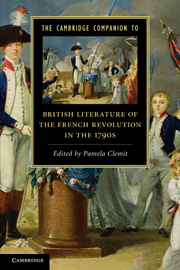Book contents
- Frontmatter
- 1 The Political Context
- 2 Burke, Reflections On The Revolution In France
- 3 Paine, rights Of Man
- 4 Burke And Paine: Contrasts
- 5 Wollstonecraft, vindications and historical And Moral View Of The French Revolution
- 6 Godwin, Political Justice
- 7 Wollstonecraft and Godwin: dialogues
- 8 Popular radical culture
- 9 Counter-revolutionary culture
- 10 Women’s voices
- 11 Novels of opinion
- 12 Revolutionary drama
- 13 Politics and poetry
- Guide to further reading
- Index
- The Cambridge Companions to...
12 - Revolutionary drama
Published online by Cambridge University Press: 28 July 2011
- Frontmatter
- 1 The Political Context
- 2 Burke, Reflections On The Revolution In France
- 3 Paine, rights Of Man
- 4 Burke And Paine: Contrasts
- 5 Wollstonecraft, vindications and historical And Moral View Of The French Revolution
- 6 Godwin, Political Justice
- 7 Wollstonecraft and Godwin: dialogues
- 8 Popular radical culture
- 9 Counter-revolutionary culture
- 10 Women’s voices
- 11 Novels of opinion
- 12 Revolutionary drama
- 13 Politics and poetry
- Guide to further reading
- Index
- The Cambridge Companions to...
Summary
The French Revolution transformed British theatre and dramatic writing, making the 1790s a pivotal decade in the nation's theatre history. The theatre of 1789 was still recognizably that of David Garrick, the pre-eminent actor-manager and dramatist who dominated the Georgian era: by 1800, however, a tectonic shift had occurred. That the Revolution had this effect was not only due to the magnitude of events in France and their impact in Britain: it was also because the Revolution challenged and defined the ideas and practices of theatricality that were integral to eighteenth-century society.
The maintenance of authority, based on the pillars of the monarchy, the church, the law and Parliament, was heavily reliant on the ‘show’ of power: George III, for example, would display himself to the people by means of processions, attendance at church and at other public occasions such as military and naval reviews, while the authority of the law was communicated by means of the solemn procession of judges through towns at assize time or by the more macabre theatre of the public execution. At the other end of the social spectrum, the lower orders often responded to the performances of the elite with their own theatrical forms of behaviour such as ritualized rioting or the burning of effigies. At the centre of this theatricalized political culture was the theatre itself. Play-going functioned not merely as a form of leisure activity but as a means of participating in the body politic.
- Type
- Chapter
- Information
- Publisher: Cambridge University PressPrint publication year: 2011
- 1
- Cited by



